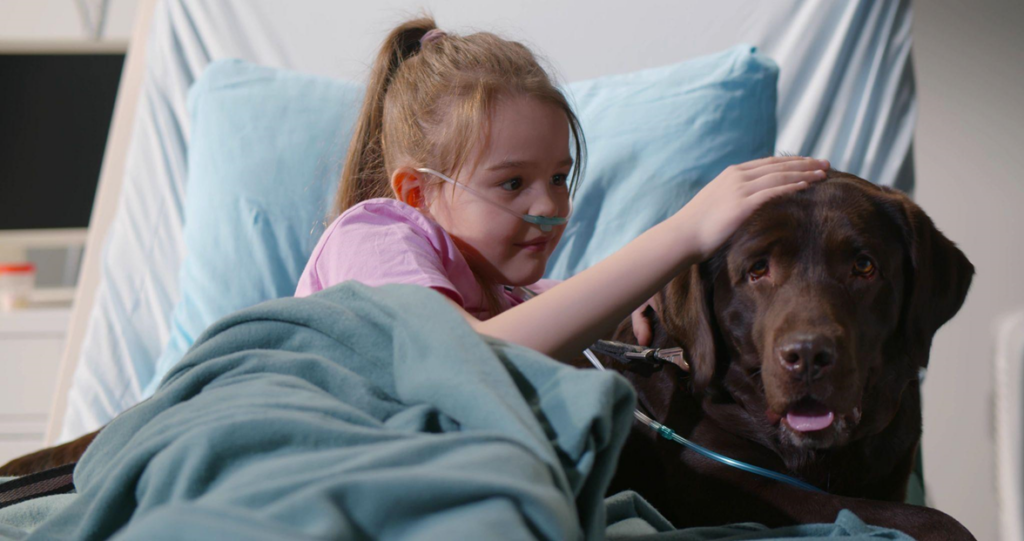Therapy dogs work in various settings to provide comfort and therapeutic benefits to individuals and groups in need. Volunteers commonly train and use these working dogs in schools, nursing homes, hospitals, disaster centers, and wherever their therapeutic benefits may be beneficial.
However, not all dogs are suitable for the role of a therapy dog. Like every working dog, therapy dogs must possess the desired traits for their role. In this article, we’ll go over what makes a good therapy dog. Read to the end as we cover the must-have qualities in therapy dogs.
What Is a Therapy Dog?
The definition of “therapy dogs” is simple: a therapy dog is a support animal that provides therapeutic benefits to individuals and groups in various settings. However, these dogs shouldn’t be mistaken for assistance animals.
Unlike service and emotional support dogs, therapy dogs aren’t intended to serve only one person. They are there to provide emotional support and comfort to anyone in need. Almost always, these individuals that therapy dogs interact with are complete strangers.
Due to the aim of therapy dogs, they must have the desired temperament for therapy work. Just as not every dog can become a service animal due to their inherent abilities not aligning with assisting an individual with a disability, the same applies to therapy dogs.
5 Qualities That Make a Good Therapy Dog
Below, you’ll discover five qualities that make a good therapy dog.
1) Friendliness
Since therapy dogs must be able to provide their therapeutic benefits to everyone, they must be friendly and outgoing. Therapy dogs should enjoy interacting with not just the people they know but also strangers in different environments and situations.

Therefore, friendliness lies at the core of a good therapy dog’s temperament. It is one of the most essential traits trainers look for in dogs undergoing therapy dog training.
2) Calmness and Tolerance
While friendliness is important, it must be paired with a calm and tolerant demeanor. Therapy dogs may perform their duties in various settings, from schools filled with loud children to the elderly in nursing homes. They must tolerate being touched unexpectedly and remain calm in all situations, regardless of the setting.
These are highly desirable traits in therapy dogs that can make or break training. While many dogs are friendly and outgoing, getting excited or hyper suddenly in response to stimuli are unwanted behaviors that may frighten individuals needing emotional support.
3) Socially Confident
Another trait of a good therapy dog is social confidence. Therapy dogs should remain confident in unfamiliar environments with lots of new sights, smells, and sounds. If a therapy dog isn’t confident enough, they may display rowdy behavior like barking and hiding due to fear and anxiety, which are highly undesired in therapy dogs.
Training often involves introducing therapy dog candidates to distractions like loud sounds and children running around to test their confidence in different social situations. One key measurement is testing if a dog gets startled easily, which will immediately disqualify a therapy dog.
4) Obedient
Like every working dog, therapy dogs must be obedient, particularly to commands like stay, sit, and recall. Obedience is a big part of therapy dog graduation that can help trainers distinguish a good therapy dog from another needing more work.

A therapy dog certification test typically requires dogs to perform basic obedience drills in the presence of distractions. These challenges for therapy dogs are usually strangers and other animals walking by to test how obedient they are to the handler’s commands while remaining calm and friendly.
5) Predictable and Reliable
All these traits necessary for a good therapy dog bring us to predictability. By ensuring that therapy dogs are predictable, their handlers will have a reliable therapy dog that can support individuals and groups of people in various settings.
With all this said, a good therapy dog is defined by the combination of traits like friendliness, tolerance, and obedience rather than one quality alone. They are predictable dogs that their handler, as well as the people they provide emotional support, can rely on.
Determine if Your Dog Would Make a Good Therapy Dog
There isn’t a single trait that makes a good therapy dog. Therapy dogs must be friendly and tolerant first and foremost but also stay attentive to the handler’s commands. If your dog is well-trained and instantly becomes friends with strangers, it is a good sign that they would make a good therapy dog.
Dogs that take time to warm up to strangers or show signs of fear and anxiety when strangers and new dogs are present don’t make good therapy dogs. If this sounds like your dog, look for other training types where they can put their abilities to good use instead. With many training possibilities, from search and rescue to psychiatric service dog work, you’ll undoubtedly find a role that suits your dog.
